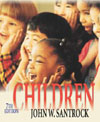 |  Children, 7/e John W. Santrock,
University of Texas, Dallas
The Science of Development
Chapter OutlineThe Stories of Erik Erikson and Jean Piaget |
 |  |  | Research on Child Development- Why Research on Child Development Is Important
- The Scientific Research Approach
|
 |  |  | Theories of Child Development- Psychoanalytic Theories
- Freud's Theory
- Erikson's Theory
- Evaluating the Psychoanalytic Theories
- Cognitive Theories
- Piaget's Cognitive Developmental Theory
- Vygotsky's Sociocultural Cognitive Theory
- The Information-Processing Approach
- Evaluating the Cognitive Theories
- Behavioral and Social Cognitive Theories
- Pavlov's Classical Conditioning
- Skinner's Operant Conditioning
- Social Cognitive Theory
- Evaluating the Behavioral and Social Cognitive Theories
- Ethological Theory
- Evaluating Ethological Theory
- Ecological Theory
- Evaluating Ecological Theory
- An Eclectic Theoretical Orientation
|
 |  |  | Research Methods- Measures
- Observation
- Interviews and Questionnaires
- Standardized Tests
- Case Studies
- Correlational and Experimental Methods
- Correlational Method
- Experimental Method
- Time Span of Research
|
 |  |  | Research Challenges- Ethics
- Gender
- Ethnicity and Culture
- Being a Wise Consumer of Information about Children's Development
|
|



 2003 McGraw-Hill Higher Education
2003 McGraw-Hill Higher Education

 2003 McGraw-Hill Higher Education
2003 McGraw-Hill Higher Education